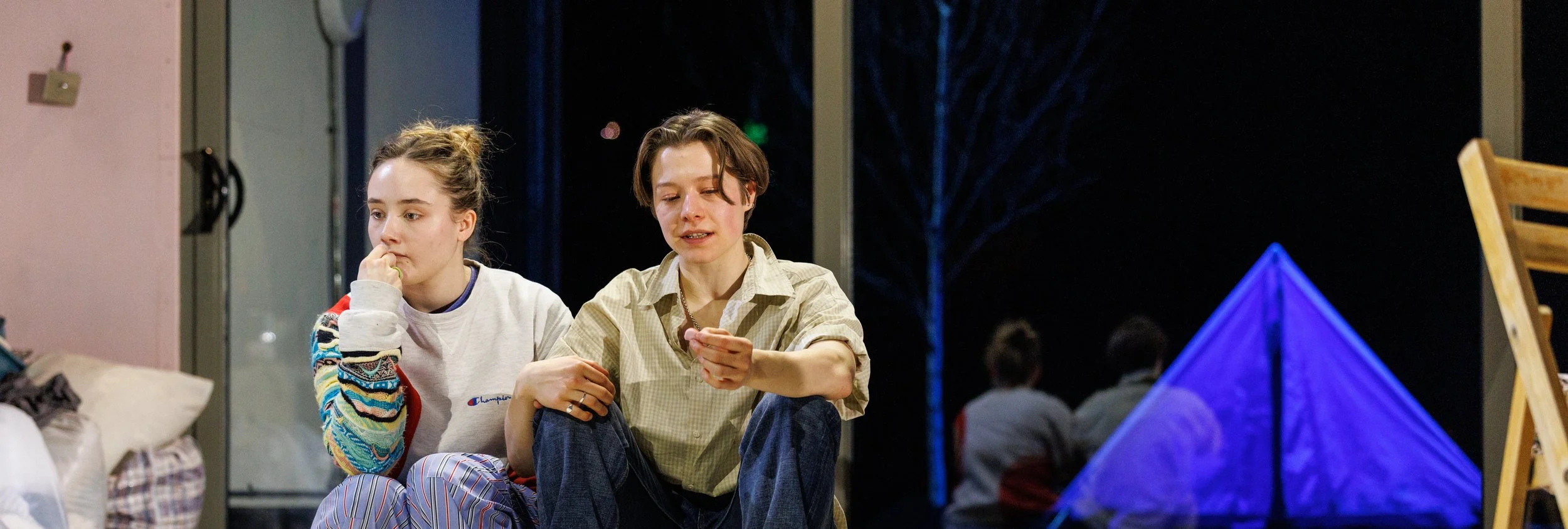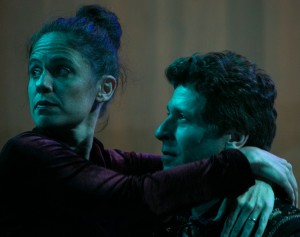We Are Your Robots, composed and performed by Ethan Lipton, is the perfect answer to the question “What do humans want from their machines?” Directed by Leigh Silverman, this musical about artificial intelligence arrives at the Polonsky Shakespeare Center like a breath of fresh air.
Macbeth (An Undoing)
Theatergoers yearning to see a new spin on Macbeth need look no further than Zinnie Harris’s Macbeth (An Undoing). Written and directed by Harris, it is a feminist version of Shakespeare’s original that puts Lady Macbeth at its center. But while Harris succeeds in expanding Lady Macbeth’s presence in the story, ultimately the playwright is defeated in increasing the character’s agency, given Shakespeare’s clear-cut trajectory of the doomed Queen.
Marcel + The Art of Laughter
The first thing to know about Marcel + The Art of Laughter is that they are two one-acts, not a single show. The first is named for one of the two performers in it: Marcello Magni—although using the French version of Marcello conveniently echoes the great mime Marcel Marceau. The second is a solo performance by Marcel’s compatriot in the first piece (and co-creator of it) Jos Houben, a Belgian. Their show is about clowning and laughter, and it has a particular European sensibility that’s engaging, offbeat and sometimes strangely familiar.
Happy Days
Samuel Beckett’s ironically titled Happy Days echoes the same vein of his jaundiced view of mankind’s fate as the line from Waiting for Godot: “They give birth astride of a grave, the light gleams an instant, then it’s night once more.” Happy Days concerns Winnie, a woman buried up to her waist in a huge sand dune in Act I, and up to her neck in Act II. It’s a deft physical characterization of dying: the earth reclaims each of us from the moment of birth, and slowly we return to it.
The Skin of Our Teeth
Thornton Wilder is best remembered as the author of Our Town and The Matchmaker, the basis for the musical Hello, Dolly! But his third great play, The Skin of Our Teeth, directed by Elia Kazan in 1943, won the Pulitzer Prize, yet the tragicomedy is more spoken about than seen, perhaps because its demands are formidable. Wilder, a great experimentalist, uses every trick in the book to chart the survival of mankind, in the persons of the Antrobus family of Excelsior, N.J., through the Ice Age, the Flood, untold wars and starving refugees.
Strained Geometry
It’s an axiom of theater that a writer shouldn’t direct his own work. Whether, if Richard Maxwell had heeded that advice, Isolde would seem more than a taxing exercise in bewilderment is an open question.
The play’s titular heroine is a woman struggling with neurosis. Her wealthy protector, Patrick (Jim Fletcher)—“she’s kind of a daughter and a wife a little bit to me”—is footing the bill for her to have a dream house built, and not just a dream house, but a perfect house. The architect she has chosen is named Massimo, but it’s unclear that Massimo (Gary Wilmes) has a talent for anything but gooey, pretentious psychobabble, although he has supposedly won awards. As it happens, Patrick has a construction company and knows the business. He challenges Massimo to put his ideas on paper, show him some schematics, but Massimo resists. Instead, Massimo begins an affair with the troubled Isolde (Tory Vazquez, who is married to Maxwell).
This mundane set-up turns out to strain credibility, and it gets scant help from the writing or the direction. Massimo expounds on “beauty that can be found in harmony” but sounds like a charlatan. He notes that “each of my projects is the start of a movement which will only be completed when it relates to the environment. The landscape is beauty. I read it like a book, I experience it and I protect it.” Patrick and Isolde come off as equally implausible. Describing Massimo, Patrick says he’s “jejune,” and notes “he left his glove on to shake my hand.” Isolde responds, “I know you hate that.” Really? How often does one shake hands with someone who’s gloved? It would have to be pretty often to build up antipathy toward the practice. And it doesn’t help that Maxwell directs his actors to deliver their lines woodenly, often just standing to face the audience. The result is that the dialogue, with emotion tamped down, frequently seems to be mere recitation.
Whether this is a way of indicating the action is from Isolde’s memory is unclear. She is a renowned actress, lately struggling to remember her lines, yet is stricken with ennui. “How long have I been doing the same thing?” she asks. “Every new project is the old project, then do it again…how many times? Get on a plane, go through a tunnel, go over a bridge.” Her name, of course, evokes the legendary Cornish love triangle of Tristan, Isolde, and King Mark, and that seems to be the role she's struggling with.
“I noticed myself and my predicament echoing through the epochs,” says Isolde’s character in the play being rehearsed, hinting at a universality in this love triangle. In any case, the legend is sidelined until late in the show, when it is explicitly invoked in a dumb show, for which Isolde appears in a gown of burgundy velvet and the men wear medieval garb and wield large swords. (Costumes are by Romy Springsguth.) Here Sascha van Riel’s bland lighting suddenly becomes saturated in garish color, but the sequence and what follows generate even more confusion.
Maxwell’s staging is also baffling. On Sascha van Riel’s set of a raised platform, some modernist chairs, and a couple walls broken by a dado rail that suggest rooms wallpapered in butcher paper, characters seem to appear from nowhere. “Here he comes,” says Isolde, and Massimo arrives. Any sense of real life, in which someone rings or knocks, someone goes to answer it, someone escorts a guest out rather than lets him wander alone through the home, is absent. The front door is apparently wide open. The scenes play as snapshots, but what’s in those snapshots doesn’t ring true.
There are some interesting passages, notably one about the refrigeration techniques of ancient Sumerians, but they are tangential, though Maxwell does prove adept at finding comedy in odd moments, thanks mostly to a fourth character, Uncle Jerry (Brian Mendes), who is also in construction and a friend of Patrick’s.
Ultimately, any message the play has is undermined by the determined obscurity and the affectless deliveries. Whether isolated images and passages will stick in one’s memory is too soon to know. But the likelihood is slim.
Richard Maxwell's Isolde plays through Sept. 27 at the Polonsky Shakespeare Center (262 Ashland Place between Lafayette Ave. and Fulton St.) in Brooklyn. Evening performances are at 7:30 p.m. on Tuesday through Sunday; matinees are at 2 p.m. on Saturday and Sunday. Tickets may be purchased by calling 866-811-4111 or visiting www.tfana.org.













